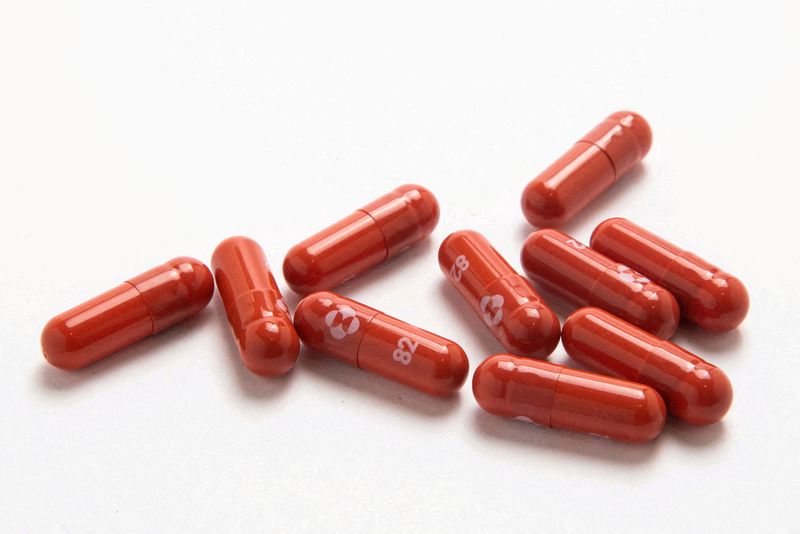(Reuters) – Merck & Co said on Thursday it expects its 2022 sales to increase as much as 18 percent over last year, mostly on sales of its new COVID-19 pill, molnupiravir.
The drugmaker said sales of the COVID-19 drug were $952 million in the fourth quarter, and it expects another $5 to $6 billion of sales for the drug in 2022. Merck developed the pill – and shares the profits equally – with partner Ridgeback Biotherapeutics.
Merck Chief Financial Officer Caroline Litchfield said in an interview it is possible the company could top those sales estimates for molnupiravir, which are based on already signed supply agreements for around 10 million courses of the drug. Merck still expects to produce an aggregate of 30 million treatment courses of molnupiravir by the end of the year, she said.
“Depending on how the pandemic plays out, could there be upside to this?” Litchfield said. “Yes, we’ve got the supply to provide more product to the markets.”
Enthusiasm for the antiviral pill, which was once touted as a potential game changer for treating COVID-19, has waned since it was shown to have about 30% efficacy in reducing hospitalizations in its clinical trial. A rival drug made by Pfizer Inc had significantly better results in its trial, but supply of that pill is constrained in the near term.
Merck said it posted fourth-quarter earnings of $4.58 billion, or $1.80 a share, up from last year when it earned $2.49 billion, or 98 cents a share. Analysts, on average were expecting earnings of $1.53 a share, according to Refinitiv IBES data.
Sales were $13.52 billion in the quarter, up from $10.95 billion last year, driven by the molnupiravir sales and growth from cancer drug Keytruda and human papillomavirus (HPV) vaccine Gardasil. Analysts had expected sales of around $13.2 billion in the quarter.
Merck said it expects 2022 earnings to be between $7.12 and $7.27 a share, just shy of analyst forecasts of $7.29 a share. It expects 2022 revenue to be between $56.1 billion and $57.6 billion, up from $48.7 billion last year.
CFO Litchfield says the company plans to reinvest much of the cash from what could be a one-year windfall from molnupiravir back in its business and to support business development.
“Our goal is to do meaningful business development. Should that not materialize, we would increase the level of share buybacks that we would do,” she said.
(This story fixes day of the week in first paragraph)
(Reporting by Michael Erman; editing by Richard Pullin)























